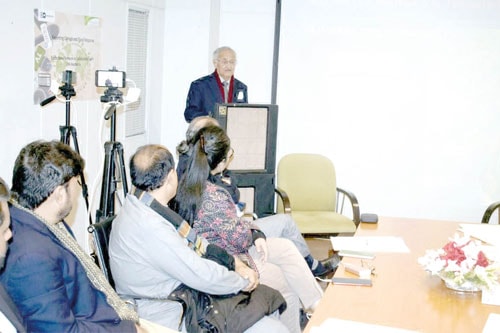Zubair Qureshi
A three-day workshop on natural disasters and environmental reporting held in collaboration with DW Academy (DWA) and Radio News Network (RNN) to brief the participants on skills of constructive reporting on natural disasters and Climate change.
They were also given opportunity to hear the opinions of experts regarding climate change. During various sessions of the workshop, Atif Tauqeer, Atif Baloch and Dina Selbeck from DW Academy explained to the journalists the methods of reporting on various environmental topics and the principles of being constructive and as well as, the importance of scientific data in constructive reporting was also explained.
Selected journalists reporting on environmental issues from Sindh, Punjab, KP, Balochistan and Gilgit-Baltistan participated in the workshop.
The participants were divided into different groups and engaged in various practical activities. Dina Sibulak said that the world is threatened by climate change and Pakistan is the eighth affected country, where there will be more problems due to the increase in temperature in the future. Therefore, there is a need for more awareness in Pakistan on this issue.
According to Dina, only 30 percent of people in Pakistan are educated about climate change and its effects, while 70 percent of the country’s population is ignorant on this issue. She said the global commitments of carbon control and transition of industries to alternative energy could not be fulfilled while Pakistan has also agreed to reduce carbon emissions by 50pc by 2030 and shift to electric cars, but the implementation is still pending. Dina mentioned the agreements made to protect the environment from threats and also talked about the violation of the Kyoto Protocol by the industrialized countries. which had a legal status but could not be implemented.
The workshop also created the Constructive Climate Journalism Network (CCNJ), a network of radio, print and digital media platforms to share environmental issues and threats. So that more people can be informed.
On the first day of the workshop, Lt. Gen (R) Nadeem Ahmed, an expert on disaster management and climate change in Pakistan, informed and briefed the participants about the rapidly changing environmental situation and said that Pakistan is the fifth most affected by climate change and global temperature.
It is a country where people, wildlife and aquatic life are affected due to natural calamities, rains and floods for the past few years.
He said that where we are suffering from this global problem, the district institutions working on the environment are also suffering from slowness in management.
, reporting and identification of risks, which is a sad fact. Gen Nadeem said that from 1850 to 2020, there has been a record increase in global temperature, which is due to the world’s major carbon producing countries, but until yesterday, these countries refused to accept that the increase in heat was caused by carbon emissions from factories. He said that the global temperature would increase by 5 degrees by 2080 and the problems are likely to increase. General Nadeem told the participants that where there is a shortage of local resources to deal with environmental problems, the government in Pakistan does not even take advantage of platforms like GCF, which provide financial assistance in this regard.
On the second day of the workshop, Nisar A. Memon, former Federal Minister for Kashmir and Gilgit-Baltistan and Chairman Water Forum Pakistan, while talking about climate change and the threats facing the Indus Delta, said that the Indus River is not just a river but it is a jewel in the crown of many civilizations. It has a history of 7,000 years and four countries are fully or partially benefiting from it. Nisar A. Memon said that the Indus river flows from the foothills of Karakoram, Hindu Kush and Himalayas for more than 3000 kilometers and falls into the delta on the coast line and before reaching there, this river gives rise to many civilizations and It also irrigates an area of 40 million acres. There is also a large population around the 1,000 meter coastline, which also benefits from the Indus River.
Talking about the problems facing the delta, he said since 1940, when the dams were built, the constant flow of water in the delta has been a problem, due to which the aquatic life and mangroves there are in danger. While the constant flow of water in the delta as well as the sea waves standing in the sea are also causing pollution. Due to lack of water in the delta, the visiting birds that used to come from Siberia and other places are also endangered in the man-made lakes and we need to repeatedly tell the government and the people in authority that they should stop this process too.










